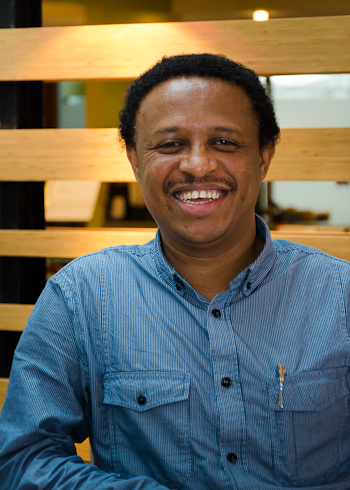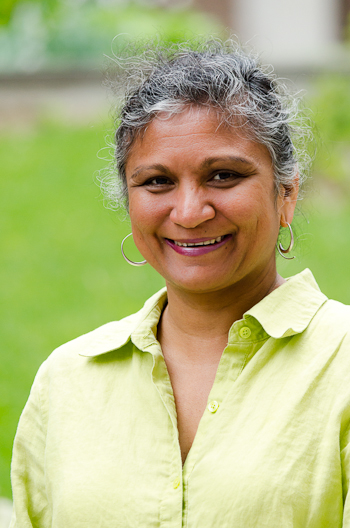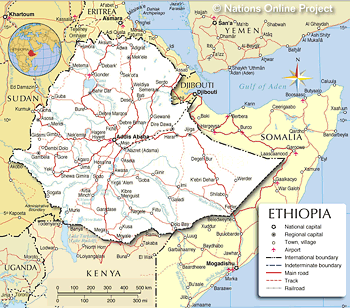Dr. Semaghan Gashu Abebe, a law professor from Ethiopia, is an O’Brien Fellow in Residence at the Centre for Human Rights and Legal Pluralism (CHRLP) at the Faculty of Law for the 2013-14 academic year. He is also McGill University’s first visitor from the Scholars at Risk Network (SAR).
By Bridget Wayland

“We are very grateful to the Faculty of Law for stepping up during Dr. Abebe’s time of need to offer him an opportunity to continue his academic work in safety,” says Clare Robinson, Director of Protection Services at Scholars At Risk, a network of more than 330 institutions around the world, including nine in Canada, that is based at New York University.
According to Dr. Nandini Ramanujam, McGill’s representative in the SAR Network and the Executive Director of the CHRLP, “Dr Abebe’s research on governance and human rights in sub-Saharan Africa, with a particular focus on large-scale land acquisition and its impact on human rights, is a great fit with the Centre’s research axis on Economic Justice.”
At McGill, Abebe is free to pursue his own academic work without the fear of reprisals he had experienced prior to fleeing Ethiopia in 2007 (see sidebar). But he also contributes greatly to the richness of intellectual life at the Faculty of Law. For instance, he is teaching a post-graduate course on Governance and Development in Sub-Saharan Africa this semester, offering seminars on his areas of expertise, and working on various projects with the other O‘Brien Fellows at the CHRLP.
While in Canada, Abebe is also doing his best to raise public awareness of the real situation in Ethiopia, on behalf of those who cannot speak freely. “I decided to go public because I want to promote human rights, and I am now living in a place where I’m safe, so I wanted to speak. That is what I have to do. The human rights situation in my country is deteriorating day by day. The situation is very serious. So, how can I be quiet about that?”
Abebe recently published an Op-ed in the Montreal Gazette, entitled “Saudi Arabia’s Treatment of Ethiopians Has Been Shameful,” in which he portrays the brutality employed in the 2013 deportation of 140,000 Ethiopians from Saudi Arabia, where they had been living as undocumented workers.
He also has two forthcoming books from Ashgate Publishing. The first, The Last Post Cold-War Socialist Federation: Ethnicity, Ideology and Democracy in Ethiopia, is based on his PhD thesis and due out in February. The second, on refugee law, which he is co-writing with another O’Brien Fellow in Residence, Anne-Marie Mooney Cotter, is in its initial stages.

“Before I came to Canada, my perception was that this country is a good host to people of different cultures and backgrounds,” he says. “Now that I have been here four months, I can attest that this is true.”
“Coming here has been a very good opportunity for me. I am thankful to the Centre, and to the Scholars at Risk Network, for helping me with this difficult situation. I admire their efforts to promote human rights and guarantee academic freedom in higher education institutions all over the world.”
Dedicated to promoting academic freedom and defending scholars and universities worldwide, SAR has so far provided assistance to more than 400 academics who had been facing harassment, censorship, surveillance and intimidation in their home countries, including a risk of arrest on false charges, detention without trial, torture, disappearance and murder.
SAR assists academics who cannot leave their home countries by facilitating academic freedom workshops and monitoring conditions across the world, among many other measures, but also acts as a matchmaker between these threatened scholars and safe institutions, such as McGill, which can offer them temporary positions.
“By joining the Scholars at Risk Network in 2010, McGill proudly reiterated its commitment to protecting and nurturing academic freedom, and expressed solidarity with courageous scholars from the global academic community,” says Ramanujam. “Dr. Abebe’s arrival is testimony to our engagement with the worldwide struggle for freedom and dignity.”
Abebe is the first Scholar at Risk to be hosted at McGill, but he certainly won’t be the last. “We are in the process of identifying a new scholar to be hosted at the Faculty of Law in Fall 2014,” says Ramanujam, “and we have plans to host more scholars at different faculties in the coming years.”
Semahagn’s Story Montreal is half a world away from the rural community of Bure, Ethiopia, where Semahagn Abebe was raised by his grandmother. One of eleven children, he soon moved to the capital city, Addis Ababa, to pursue higher education and launch his career. He earned his LL.B. from Addis Ababa University in 1996, and started to work as a Public Prosecutor for the Ministry of Justice. |
[ JUMP TO THE CURRENT EDITION OF FOCUS ONLINE ]
